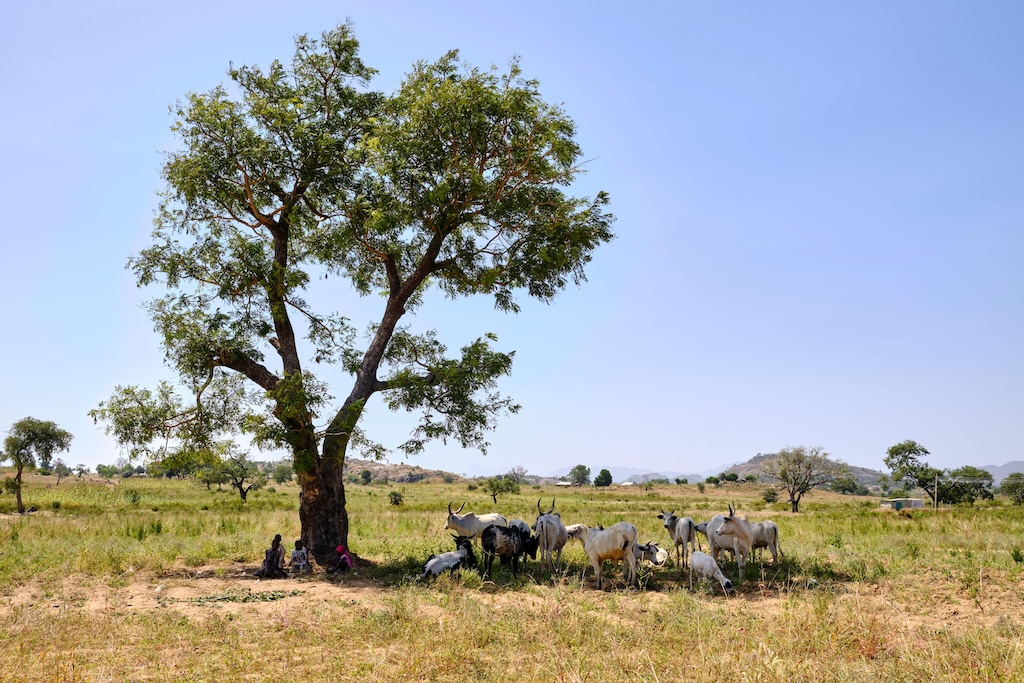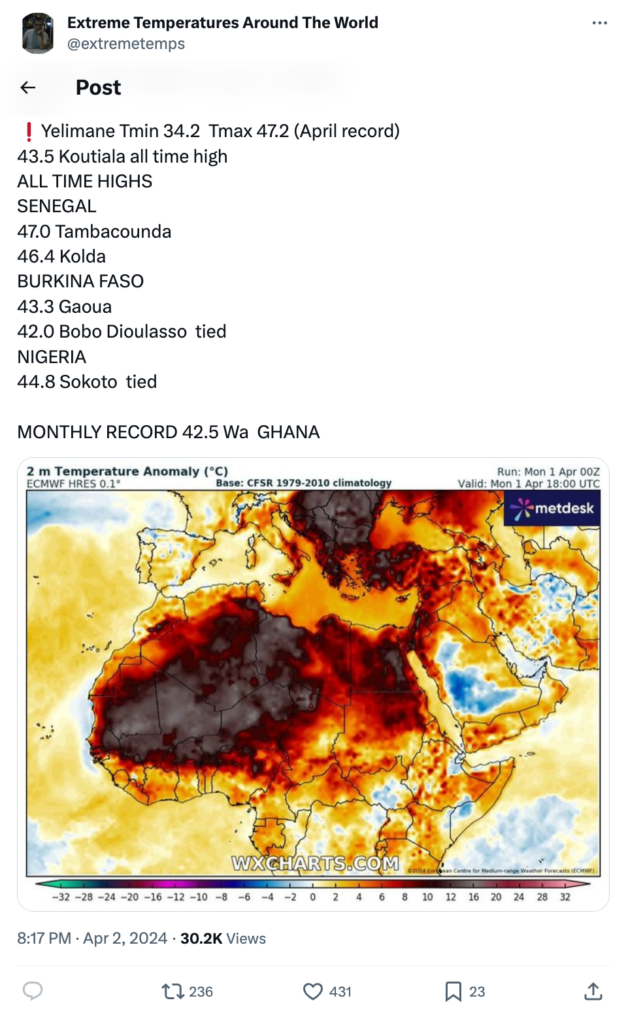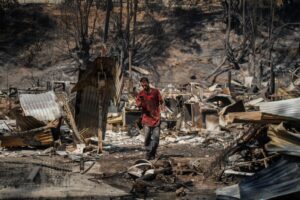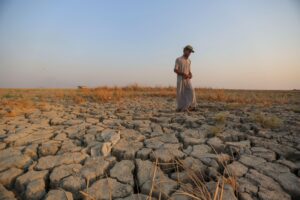
How Nigeria is reeling from extreme heat fuelled by climate change
Solomon Elusoji
04.08.24Solomon Elusoji
08.04.2024 | 10:44amSince the start of this year, Africa’s most populous nation Nigeria has faced prolonged stretches of severe heat.
A recent quick-fire analysis found that the conditions in February, when temperatures exceeded 40C, were made 10 times more likely by human-caused climate change.
But the heat is still ongoing, with temperatures reaching a record 44.8C in Sokoto, a city in north-western Nigeria, on 1 April.
With records of heat and its impacts lacking in Nigeria, Carbon Brief speaks to doctors, farmers and meteorologists about how this episode of extreme weather is affecting the country.
Health impacts
The ongoing extreme heat in Nigeria is having a range of health impacts – and most of these are not being routinely recorded, experts tell Carbon Brief.
On 28 March, Nigeria’s national electricity grid collapsed, plunging the country into a general blackout for the second time during the heatwave.
Despite its wealth of oil and gas, blackouts are common in Nigeria and many people rely on petrol and diesel generators to cool their homes. However, fuel prices have skyrocketed in the past year, putting such alternatives out of the reach for many Nigerians.
The impact of the heat is “catastrophic”, Dr Ugo Uguwanyi, a doctor in Abuja, Nigeria’s capital city, tells Carbon Brief:
“Don’t even bother to step out from 10am to 6pm. And make sure you burn the diesel to power the air conditioning to be able to sleep at night.”
Information about the heatwave’s impact is limited, but this does not mean the weather conditions are not dangerous, according to the authors of the recent analysis into the role of climate change in Nigeria’s extreme heat. Rather, a lack of systematic reporting may obscure what they described as a “silent killer”.
The study’s authors called for “improved monitoring and research on the impacts and risks associated with heatwaves”.
Nigeria’s dry season runs approximately from December through to March – although it is longer in the north of the country and shorter in the south. Temperatures build during this season, typically bringing more reported cases of “meningitis, stress, stroke, blood pressure and stroke”, Dr Uguwanyi says.
Such cases are likely to increase during intense heatwaves, which are projected to become more common if global warming continues to accelerate, he adds.
Dr Ebbi Robinson, chairman of the Nigeria Medical Association in the oil-rich, southern state of Rivers, adds that while “there is no specific documentation”, extreme heat typically brings an increase in hospital visits to dermatologists, with symptoms such as rashes and itching.
He says that his association is rolling out new methods to warn people of the health impacts from extreme heat:
“We are making radio jingles and banners to let people know these heatwaves are real and sensitise them on how to mitigate against the direct and indirect consequences.”
In mid-February, the Nigerian Meteorological Agency (NiMet) issued a public forecast warning on the prolonged heatwave.
The agency advised citizens to stay hydrated, wear light clothing and avoid direct exposure to high temperatures during peak periods. A group of Nigerian doctors also issued safety tips.
Wasiu Adeniyi Ibrahim, a meteorologist at NiMet, tells Carbon Brief:
“Heatwaves, characterised by prolonged periods of excessively hot temperatures and humidity, are becoming more frequent and intense.
“We have observed a departure of 2-4C from normal (long-time average temperature, 1991-2020) in the month of February. It is clear that climate change is bringing more and more dangerously hot days to Africa.”
Workforce impacts
In February, NiMet’s director of weather forecast services, Vincent Weli, advised that a state of emergency be declared in states most affected by the heatwave and workers be allowed to take breaks between noon and 3pm. Speaking to Nigeria’s Channels Television, Weli said:
“Of course, you know, with high temperature, cognitive development will be affected and productivity will be affected. There will be a loss of concentration.”
The call was necessary as “the condition was favourable for an outbreak of meningitis”, Ibrahim explains to Carbon Brief:
“We observed high dust concentration combined with this excessive heat which could trigger a meningitis outbreak. Epileptic power supply, low ventilations and other factors could make the situation worse, if not properly controlled.”
Meningitis, an inflammation of the membranes covering the brain and the spinal cord, is more easily spread in extreme heat and dusty conditions.
However, no such directive has been issued by state governments.
“Many state governments in Nigeria are not taking weather and climate information very seriously,” Ibrahim says.
Meanwhile, in Lagos, Nigeria’s most populated city, ride-hailing drivers are operating under “melting” conditions, stuck between preserving their health or livelihood, according to a Rest of World report.
Agricultural impacts
The heatwave is also expected to reduce agricultural productivity, a sector that contributes about 22% to Nigeria’s gross domestic product (GDP) and accounts for more than a third of total employment. Ibrahim tells Carbon Brief:
“Heatwaves can reduce agricultural productivity by causing heat stress to crops and livestock.
“It could negatively affect crop growth and development by disrupting physiological processes, such as photosynthesis, respiration and water uptake. High temperatures can lead to wilting, leaf scorching and reduced nutrient uptake, impairing plant growth, fewer fruits and reducing yields.
“In animals, heatwaves may reduce feed intake, lower weight gain, decrease milk production, reduce reproductive performance and [cause] animal mortality, if proper mitigation measures are not in place.”

Again, there is not a lot of data on how the current heat is affecting agriculture in Nigeria.
However, the national secretary of the All Farmers Association of Nigeria, Yunusa Halidu, tells Carbon Brief its members expect the heatwave to affect productivity yield this year. He says:
“The heat is extreme this year,although we have been expecting it, as we work with the Nigerian Meteorological Agency. We know it is global warming and we are working to see how we can mitigate the effects.”
A shorter version of this article was first published in DeBriefed, Carbon Brief’s weekly climate newsletter, on 5 April. Subscribe for free.






